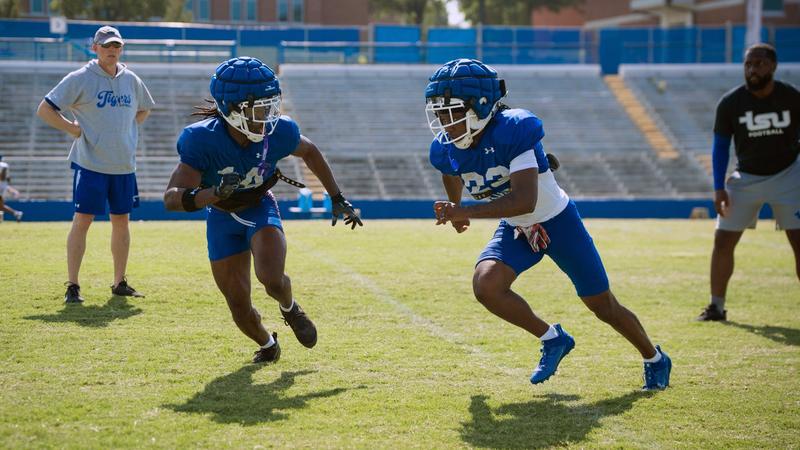By: Nick Guerriero, Assistant AD – Communications & Broadcasting
Story Links
When Jerod Kruse joined Tennessee State this summer as special teams coordinator and secondary coach, he immediately recognized the Tigers had something many college programs lack: depth in the defensive backfield.
“Coming from the NFL, you’re used to traveling with seven or eight defensive backs,” Kruse said. “Here, we’ve got 11 or 12 guys who can all contribute in some way. That’s a blessing.”
That depth, combined with Kruse’s emphasis on teaching and player development, could play a major role in TSU’s push for consistency in 2025. After years of tutelage under around Gregg Williams‘ defensive system, the secondary is expected to anchor a Tigers defense that prides itself on physical play and speed.
Kruse is not building the group alone. Former Super Bowl MVP Dexter Jackson, who played more than a decade in the NFL, works closely with the defensive backs, while analyst Justin Hannah provides additional support after professional stints in the CFL and NFL camps. Together, the staff is creating an environment centered on accountability and growth.
“These guys have taken coaching really well,” Kruse said. “We coach them hard in practice, then on game day we want them to play fast and confident. That balance has helped them grow through camp.”
A longtime collaborator with current TSU defensive coordinator Gregg Williams, Kruse has carried a consistent philosophy throughout his career: players respond to coaches who make them better.
“Our philosophy has always been that players will follow you if they believe you can help them improve,” Kruse said. “Gregg has turned more undrafted free agents into Pro Bowlers than just about anyone in the last 25 years. That’s development. That’s what we’re bringing to TSU—finding each player’s strength and holding them accountable to it.”
Kruse’s coaching toolbox also includes an innovative background with technology. He has consulted with EA Sports on the Madden video game series, helping design scheme adjustments. That experience, he said, has given him a new perspective on how young players learn the game.
“Practice mode is an incredible teaching tool,” Kruse said. “Players can run formations, recognize alignments and communicate in real time with a joystick in hand. The brain doesn’t distinguish between mental reps and physical reps, so you can stack learning without adding wear and tear on the body.”
Those methods align with Tennessee State’s broader embrace of analytics and artificial intelligence. Kruse saw the trend firsthand in his recent stint with the Cleveland Browns, where AI-driven teaching tools and virtual meeting rooms became part of daily preparation.
“AI is the buzzword right now, and everybody is figuring out how it fits,” he said. “Some of the technology can break down film faster, and virtual teaching models can help players get more reps without taking more hits. At the end of the day, it’s all about making them better and keeping them healthy.”
For Kruse, the message to his players at TSU is simple: they are here because they have talent, and it’s his job to maximize it.
“They wouldn’t be here if they didn’t have something special,” Kruse said. “Our job is to figure out what that is, develop it, and put them in positions to succeed. If they believe you can make them better, they’ll give you everything they’ve got.”
As the Tigers prepare for the 2025 season, Kruse’s blend of NFL experience, innovative teaching, and emphasis on player development may be exactly what helps turn depth into dominance.

